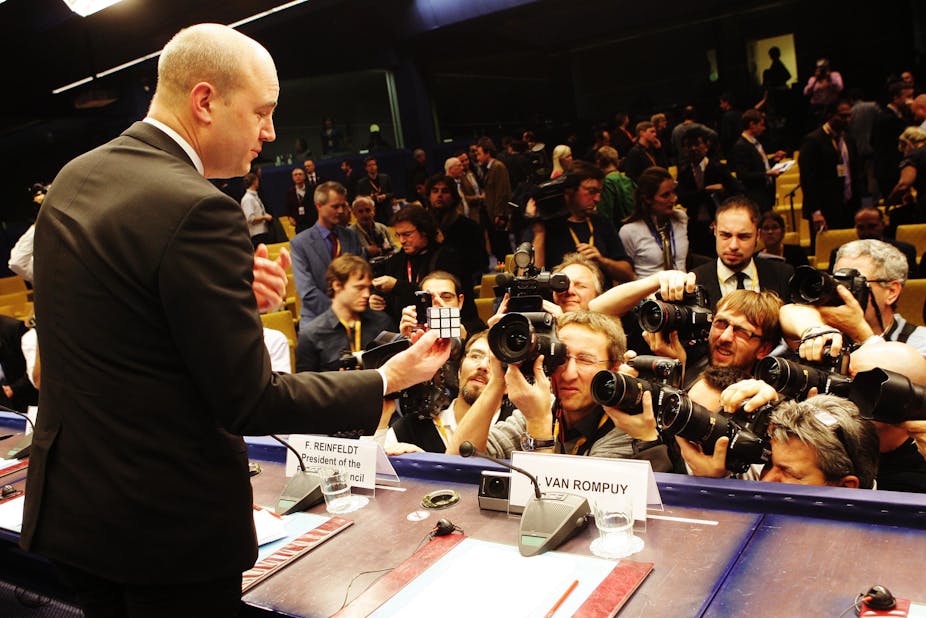This is a “super-election year” in Sweden. Voters will elect four sets of representatives within just a few months. In September, they vote for national parliamentarians and, on the same day (as is customary), also county and municipal councillors. Before that, on May 25, Swedes will allocate their 20 seats in the European Parliament.
Less than a month before the European election, it is fair to say that the campaign in Sweden has not yet caught fire. Everyone agrees that the national election in the autumn is far more important – especially as a change of government is in the offing.
In winning consecutive terms in office, the four-party Alliance coalition has been a historic success for Sweden’s centre-right. However, despite the advantage of a buoyant economy, the government has run out of steam since losing its parliamentary majority in 2010. The previously dominant party, the Social Democrats, probably with the Greens and possibly also the Left Party, look set to return to power – although they, too, might well have to manage as a minority government. This is due to the presence of the newest party in parliament, of which more below.

The distraction of national politics is not the only reason for the tepid European campaign. The economic crisis has taken its toll. Certainly, Swedish voters, though much less hostile to the EU than they once were, are not brimming over with enthusiasm for it.
Naturally, the parties reflect this. Even the Moderates, the biggest Alliance party and usually firmly pro-EU, have been critical of aspects of the EU’s policies. The two smallest Alliance parties, the Centre Party and the Christian Democrats, have also sounded sceptical, though still fairly mildly so (there are few genuine Eurosceptics on the centre-right in Sweden). These two parties are the most precariously placed in Swedish politics. Neither can be sure of retaining its national and European parliamentary representations this year.
Among the opposition parties, meanwhile, the Social Democrats, long divided on Europe, have every reason to run a modest campaign with modest targets. The Left sticks staunchly to its anti-EU guns.

Only two parties currently sound more positive about the EU. The fourth governing party, the Liberals, are one – though even they see little point in advocating much more integration, such as Sweden’s adoption of the euro, any time soon. The other more enthusiastic party, perhaps surprisingly, is the Greens. They now advocate greater EU powers to enforce environmental protection and democratic norms, which marks quite a change from the opposition to Sweden’s EU membership that the party maintained until 2008.
Scepticism, more or less
For now, then, the European campaign in Sweden seems likely to exhibit two main features.
The first is a revival of the pro-versus-sceptical dimension in political debate. It had seemed to retreat somewhat in the 2009 campaign. Specific European-level policy issues, such as labour-market and health-service integration, became prominent. This year, however, a vaguer campaign, revolving around “more” or “less Europe”, seems probable. Perhaps, given the Union’s efforts to centralise control of its financial system, a renewed focus on vertical power distribution is inevitable.
The second likely feature of this European campaign is specific to Sweden, though it has equivalents in many other countries. Indeed, it involves a sort of national navel-gazing.
The Sweden Democrats have, since 2010, established themselves as an eighth party in the national parliament. They are comparable in different ways to the Danish People’s Party or the French National Front or, less closely, to the Dutch Freedom Party or UKIP. If any party manages to exploit prevailing Eurosceptical opinion, it will probably be the anti-EU Sweden Democrats (rather than the June List, which won three seats in 2004, or the Pirate Party, which took two in 2009).
Still, Euroscepticism is a minor part of the Sweden Democrats’ profile. Their anti-immigration stance is what really characterises them, and the other parties ostracise them for it. The party poses a big challenge to the two blocs that otherwise structure the Swedish party system. Can either bloc win a parliamentary majority while the Sweden Democrats are around?
The Sweden Democrats also pose a challenge to the Swedish political media, which have become ever more preoccupied with them (thus confirming the adage about there being no such thing as bad publicity). Should the party win its first European mandate, perhaps even two of them, it would put the wind in its sails prior to September’s national election. With the Sweden Democrats thus on centre stage, this year’s European election may turn out to be the most “second-order” – that is, run in the shadow of national-level politics – that Sweden has yet experienced.

